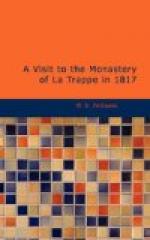Approaching nearer to Tours, I had a fine view of the bridge, which is esteemed the handsomest in France. Between the branches of the trees, I now and then caught a glimpse of the spires of the church and buildings, encompassed by extensive orchards and groves, and open vales between, varied by vineyards. It was a jour de fete, and as I drove through the town the streets were gay with holyday people, and crowded in some places with groups of women and girls, whose cheerful countenances proved the admiration with which they viewed the performances of some mountebanks.[12] Tours is the chief seat of the prefecture of the Indre-et-Loire, formerly the capital of the province of Touraine, and is built on a plain on the bank of the Loire. The houses are of a white stone, and in the principal streets well built and lofty: it is altogether one of the handsomest towns in France. The main street, the rue Royale, can boast of a foot pavement, which is seldom to be met with in this country. The environs of the town are also very beautiful; the luxuriance of the soil, abounding in vines, fruits, and every article of life, has attracted such numbers of English to its vicinity, that Tours may be almost considered an English colony.
[Footnote 12: There is no city in Europe where there are more of these sort of people to be seen than at Paris, on the boulevards and different carrefours. The fondness of the Parisians for shows has existed for ages. In a tariff of Saint Lewis for regulating the duties upon the different articles brought into Paris by the gate of the little Chatelet, it is ordained, (Hist. LVIII. cxxxiii.) that whosoever fetches a monkey into the city for sale, shall pay four deniers; but if the monkey belongs to a merry-andrew, the merry-andrew shall be exempted from paying the duty, as well upon the said monkey as on every thing else he carries along with him, by causing his monkey to play and dance before the collector! Hence is derived the proverb “Payer en monnoie de singe,” i.e. to laugh at a man instead of paying him. By another article, it is specified, that jugglers shall likewise be exempt from all imposts, provided they sing a couplet of a song before the toll-gatherer.]




